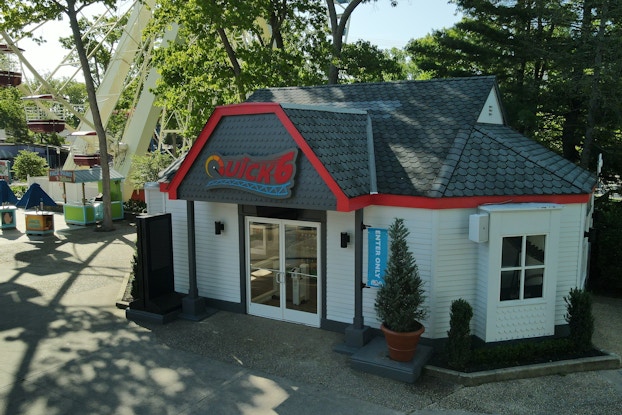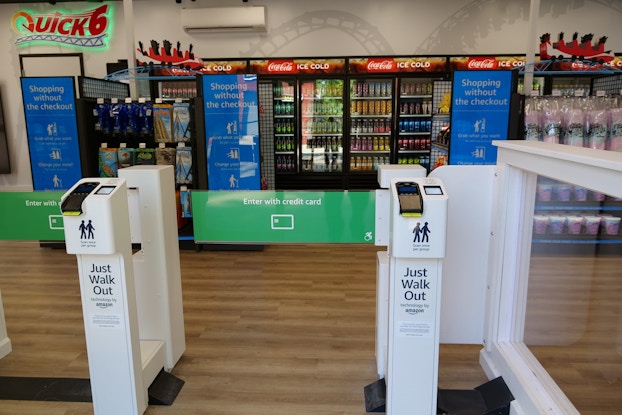
Why it matters:
- Post-pandemic, theme park operators became laser-focused on improving the guest experience for a consumer base that’s willing to pay more for out-of-home entertainment.
- Yet attendance is still below pre-pandemic levels; Consumers shaped by the digital conveniences of the attention economy — whereby human attention has become an increasingly scarce commodity — have become less tolerant of the long waits in line synonymous with the theme park experience.
- Against that backdrop, Six Flags’ new Quick 6 store, powered by Amazon’s Just Walk Out technology, is the first theme park venue to deploy cashierless checkout to reduce lines.
A newly opened retail store at Six Flags Great Adventure in Jackson, New Jersey, is testing technology that it hopes will alleviate some of the long lines that annoy theme park attendees.
Six Flags is partnering with Coca-Cola and Amazon to test a cashierless checkout system at the newly opened Quick 6 store at the park. The store, which features Amazon’s Just Walk Out technology, sells items such as snacks, sunscreen, ponchos, and park mementos. Customers simply scan a credit card when they enter the store, and a high-tech system of cameras and sensors keeps track of what each customer selects, and charges them automatically when they leave.

Interested in a small business membership?
Find out how the U.S. Chamber of Commerce can help your company grow and thrive in today's rapidly-evolving business environment. Connect with our team to learn how a small business membership can benefit your bottom line and help you achieve your goals.
“The technology eliminates the need for our traditional checkout process,” said Stephanie Borges, Vice President of Strategic Marketing and Partnerships at Six Flags, in an interview with CO—. “You literally just walk out.”
Long waits are a significant customer aggravation at theme parks in general, given that many of these lines are filled with impatient youngsters often eager to experience as many rides as possible in a single day.
That’s even more true as today’s DoorDash-ordering, Uber-hailing, Netflix-streaming consumers, with instant gratification digital conveniences at their fingertips, are increasingly shaped by the “attention economy.” In the digital era, the theory goes, human attention has become an increasingly scarce commodity.
“The goal was really for us to enhance the guest experience and take something that was traditionally a pain point and make it seamless,” said Borges.
‘The pandemic revealed a sophisticated consumer base that is willing to pay more for out-of-home entertainment and experiences’
The debut of the Quick 6 store comes as theme parks are rethinking their business models to meet the demands of today’s consumers and drive profitable sales. Demand for out-of-home entertainment remains high, but theme parks are also competing with overseas travel and other vacation destinations such as national parks for a share of consumers’ discretionary spending.
“In 2022, operators became laser-focused on improving the guest experience,” said Francisco Refuerzo, Senior Analyst, AECOM Economics + Advisory, an infrastructure consulting firm that has been following the performance of theme parks.
“The pandemic revealed a sophisticated consumer base that is willing to pay more for out-of-home entertainment and experiences,” AECOM concluded in its most recent report, published in partnership with the Themed Entertainment Association. “However, consumers also demand more in terms of comfort, ease, quality, and satisfaction. Overall tolerance for big crowds and long waits seems to have gone down.”
The report found that attendance at the world’s top 25 theme parks rose 41% in 2022 over 2021 levels, when the industry was still recovering from a sharp pandemic downturn. Total attendance in 2022 was still 78% below the pre-pandemic levels of 2019, however.
The numbers were similar for the top 20 theme parks in North America, which saw attendance increase by 34% in 2022, to 140,453, which was 88% of 2019 levels of 159,108.
A key trend that has emerged in theme park operators’ effort to recover from the pandemic has been its use of technology to improve the guest experience, the report noted.
[Read: 4 Ways Pickleball’s Fast-Growing Popularity Is Creating Sales Opportunities for Businesses]
The goal was really for us to enhance the guest experience and take something that was traditionally a pain point and make it seamless.
Stephanie Borges, Vice President of Strategic Marketing and Partnerships, Six Flags
Monitoring customer reaction to Amazon’s ‘Just Walk Out’ technology: ‘There is a lot of learning you can get from the habits of people in the store’
Six Flags is closely monitoring the performance of Quick 6 and how its customers react to the Just Walk Out technology, and what they buy, Borges said.
“There is a lot of learning you can get from the habits of people in the store,” said Borges.
The technology is also slated to be implemented at a store in a Six Flags theme park in Los Angeles in August, and additional installations are under consideration.
The Just Walk Out implementation at the Quick 6 store in New Jersey is not the first time Six Flags has leveraged technology in an effort to alleviate lines at its theme parks. The company also has a line-busting technology for rides called THE FLASH Pass that lets customers wait in line virtually. For an extra charge, customers can reserve a place in line through an app, then head straight to a special ride entrance when they are notified that their turn is coming up.
Six Flags is currently focused on evaluating technology for use in retail and food venues. This could include solutions other than Amazon’s Just Walk Out if the right situation arises, Borges said.
The Quick 6 store, which measures about 400 square feet, was an existing location that had most recently been used for storage and previously served as a temporary store for a holiday event.

Brisk sales of grab-and-go items: ‘We know that they want to shorten the line, to be able to get food more quickly’
In the first several weeks of operation, cold beverages, refrigerated candy, and sunscreen were among the top-selling products in the store, which Borges said she attributes to the ability to grab-and-go needed items on hot summer days.
“We will still look at how much revenue the building can produce, and if this is something consumers want, and if they’d be interested in using it,” said Borges. “We know that they want to shorten the line, to be able to get food more quickly, but this is new. We are the first theme park to do this.”
The support of Coca-Cola, which Borges described as a strategic partner in the test, has been critical, she said.
“Coke has been a great partner for this, allowing us to test and learn as we go,” said Borges.
She said she believes it’s important to take risks with new technologies and test new solutions as a learning experience.
“If something fails, that’s fine, just as long you are always trying and learning,” said Borges. “That’s the key piece. I think there’s a lot more to come out of this that we don’t even know about today.”
-Barbara Thau contributed to this story.
CO— aims to bring you inspiration from leading respected experts. However, before making any business decision, you should consult a professional who can advise you based on your individual situation.
CO—is committed to helping you start, run and grow your small business. Learn more about the benefits of small business membership in the U.S. Chamber of Commerce, here.







